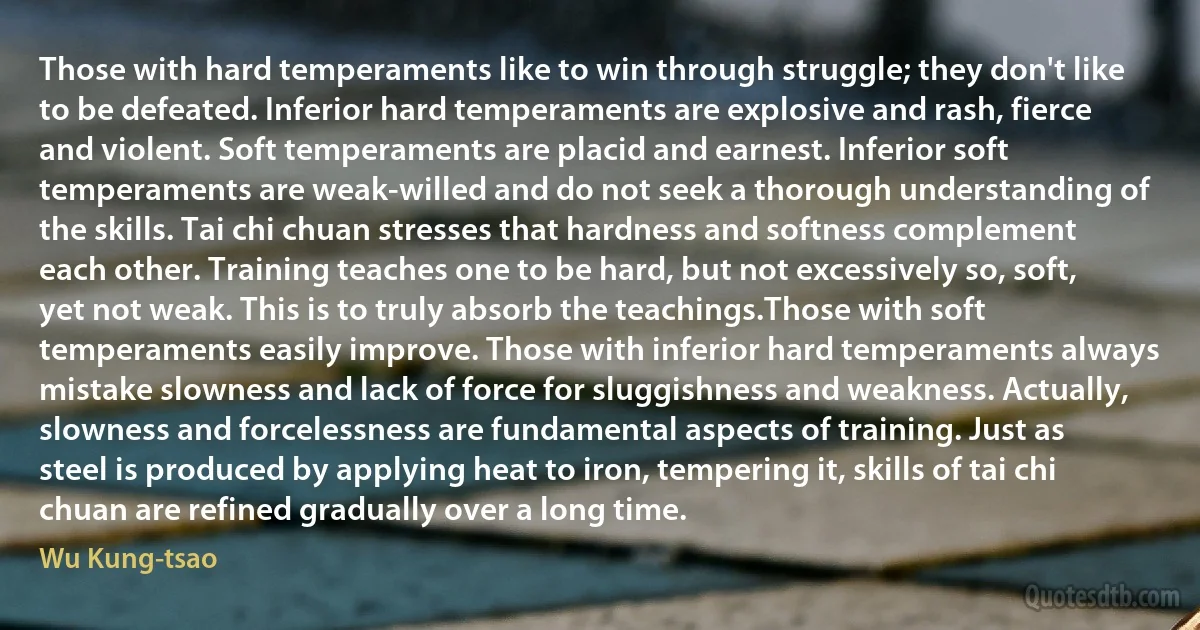
Those with hard temperaments like to win through struggle; they don't like to be defeated. Inferior hard temperaments are explosive and rash, fierce and violent. Soft temperaments are placid and earnest. Inferior soft temperaments are weak-willed and do not seek a thorough understanding of the skills. Tai chi chuan stresses that hardness and softness complement each other. Training teaches one to be hard, but not excessively so, soft, yet not weak. This is to truly absorb the teachings.Those with soft temperaments easily improve. Those with inferior hard temperaments always mistake slowness and lack of force for sluggishness and weakness. Actually, slowness and forcelessness are fundamental aspects of training. Just as steel is produced by applying heat to iron, tempering it, skills of tai chi chuan are refined gradually over a long time.
Wu Kung-tsaoRelated topics
applying complement explosive force fundamental hard heat inferior iron lack mistake seek soft steel thorough time understanding weakness win yetRelated quotes
This defective approach to scholarship was suffered by different categories of colonial student. Many of them had been handpicked and, so to say, carried certificates of worthiness with them. These were considered fit to become enlightened servants of the colonial administration. The process by which this category of student became fit usually started at an early age, for not infrequently they had lost contact early in life with their traditional background. By reason of their lack of contact with their own roots, they became prone to accept some theory of universalism, provided it was expressed in vague, mellifluous terms. Armed with their universalism, they carried away from their university courses an attitude entirely at variance with the concrete reality of their people and their struggle.

Kwame Nkrumah
Once helium burning has occurred... the next possible reaction-carbon burning-is not necessarily slow... This reaction involves ...a strong as opposed to a weak interaction. ...Carbon burning results in magnesium. ...Taking a cross section of a highly evolved star would reveal a system of many layers. The inner layers have been subjected to the largest pressures, thereby forced to the highest temperatures, and burned the furthest; the outermost layers, by contrast, have not burned at all. Thus, as we proceed from outside in, there will be an outermost layer with the initial mix of hydrogen and helium, a layer of mostly helium, a layer of carbon, a layer of magnesium, and so on. ...So we arrive at the picture of a star, in the latest stages of its evolution... now composed of mostly carbon nuclei and other explosive material.

Frank Wilczek
But first a hush of peace, a soundless calm descends;
The struggle of distress and fierce impatience ends
Mute music sooths my breast - unuttered harmony
That I could never dream till earth was lost to me.
Then dawns the Invisible; the Unseen its truth reveals;
My outward sense is gone, my inward essence feels -
Its wings are almost free, its home, its harbour found;
Measuring the gulf, it stoops and dares the final bound -
O, dreadful is the check - intense the agony
When the ear begins to hear and the eye begins to see;
When the pulse begins to throb, the brain to think again,
The soul to feel the flesh and the flesh to feel the chain.
Yet I would lose no sting, would wish no torture less;
The more that anguish racks the earlier it will bless;
And robed in fires of Hell, or bright with heavenly shine
If it but herald Death, the vision is divine -.

Emily Brontë
The time has not yet come for dealing with the world illusion on a large scale, for the race is not adequately mental nor has the illusion (which is, as I have stated, pre-eminently the result of the misinterpretation of ideas) reached its height. But the hour has struck for the first steps to be taken in the dissipation of glamour, and the hold of glamour upon the race should be appreciably lessened in the future. Hence the practical training now being given in this group in their own lives; hence also the intended teaching later to be given to the group-if they measure up to the opportunity-which will enable them to aid in the concerted and planned attack upon the world glamour. Wrestle therefore with your personal problems along these lines, my brothers, for in this way you will gain facility in discernment, in clear precise action, and in strengthened understanding.

Alice Bailey
I've always resented the word maturity, primarily, I think, because it is most often used as a club. If you do something that someone doesn't like, you lack maturity, regardless of the actual merits of your action. Too, it seems to me that what is most often called maturity is nothing more than disengagement from life. If you meet life squarely, you are likely to make mistakes, do things you wish you hadn't, say things you wish you could retract or phrase more felicitously, and, in short, fumble your way along. Those "mature” people whose lives are even without a single sour note or a single mistake, who never fumble, manage only at the cost of original thought and original action. They do without the successes as well as the failures. This has never appealed to me and that is another reason I could never accept the common image of maturity that was presented to me.

Alexei Panshin
